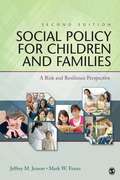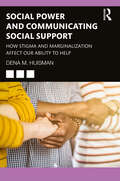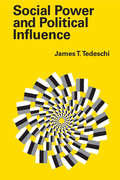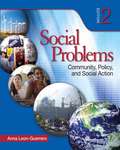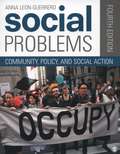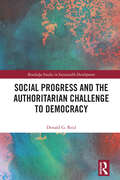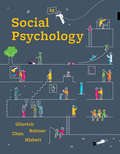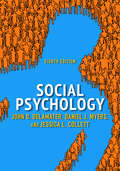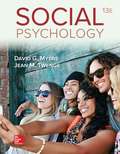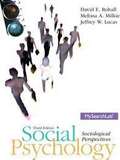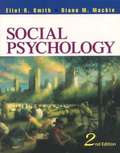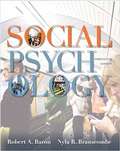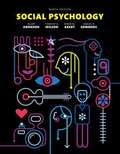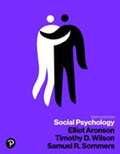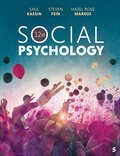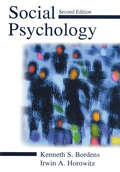- Table View
- List View
Social Perspectives in Mental Health: Developing Social Models to Understand and Work with Mental Distress
by Martin Webber Jerry Tew Peter Beresford Sarah CarrSocial Perspectives in Mental Health offers new practice frameworks that help to make sense of people's mental distress and recovery in relation to their social experience. This interdisciplinary volume promotes a holistic approach to mental health practice, with an emphasis on recovery and empowerment, and on building on the experiences of service users. The contributors explore the impact of social factors, such as power, abuse, ethnicity, gender and sexual orientation, on the causes and experiences of mental health problems. It is also considered how concepts such as risk and recovery can be understood from a social perspective. Drawing on expertise from a wide range of academic, policy and practice settings as well as lived experience, this book is essential reading for practitioners, students and educators in the fields of mental health and social work.
Social Philosophy of Science for the Social Sciences (Theory and History in the Human and Social Sciences)
by Jaan ValsinerThis is an international and interdisciplinary volume that provides a new look at the general background of the social sciences from a philosophical perspective and provides directions for methodology. It seeks to overcome the limitations of the traditional treatises of a philosophy of science rooted in the physical sciences, as well as extend the coverage of basic science to intentional and socially normative features of the social sciences. The discussions included in this book are divided into four thematic sections: Social and cognitive roots for reflexivity upon the research process Philosophies of explanation in the social sciences Social normativity in social sciences Social processes in particular sciences Social Philosophy of Science for the Social Sciences will find an interested audience in students of the philosophy of science and social sciences. It is also relevant for researchers and students in the fields of psychology, sociology, economics, anthropology, education, and political science.
Social Phobia
by Ariel StravynskiSocial phobia and disruptive social anxiety are features of the lives of many thousands of people. But exactly what is social phobia? What causes it? What is its nature and what kinds of treatments can improve it? Using key concepts and methods and a substantive body of research, this book aims to answer these questions and clarify social phobia by means of critical discussions and examination of evidence. It takes a sceptical stance towards the received view of social phobia as a species of disease caused by a deficient inner mechanism and considers an alternative construal of social phobia as a purposeful interpersonal pattern of self-overprotection from social threats. The possibility that social phobia might not actually exist in nature is also considered. Fearing Others will appeal to researchers, clinicians and students in clinical and health psychology and psychiatry.
Social Policy for Children and Families: A Risk and Resilience Perspective (Second Edition)
by Mark W. Fraser Jeffrey M. JensonIncorporating cutting-edge research, the authors of this multidisciplinary text offer new evidence that a public health framework based on ecological theory and principles of risk and resilience is essential for the successful design of social policy. Contributing authors apply the editors conceptual model across the substantive domains of child welfare, education, mental health, health, developmental disabilities, substance use, juvenile justice, and now poverty. This is an ideal core text for graduate and upper level undergraduate courses entitled Social Policy, Advanced Social Policy, or Social Work with Children and Families in departments of social work, family studies, human services, sociology, public health, or psychology. It is also a vital resource for elected officials, policy makers, and others interested in the evolution of policies aimed at preventing problem behaviors and supporting children and families.
Social Power and Communicating Social Support: How Stigma and Marginalization Affect Our Ability to Help
by Dena M. HuismanThis book gives readers an understanding of the theoretical foundations of social support communication along with practical tools to ethically and justly connect with and support others in daily life. Incorporating research, real-world examples, and autoethnographic methods, this book examines how social hierarchies, personal power dynamics, and relational and social histories can be better understood to create stronger social support messages across all our relationships, including family, friend, workplace, and health provider-patient relationships. The book translates theories of social support communication into practical application, examining how support messaging goes wrong and how to do it right. Intended as a supplementary text in interpersonal communication, psychology, and social work undergraduate courses, the book is also ideal for professionals who engage in caretaking and support tasks and wish to enhance their knowledge of social support theory.
Social Power and Political Influence
by James T. TedeschiThe nature of social power, the ability of individuals to affect the behavior and belief of others, is central to any understanding of the dynamics of change in our society. It is therefore surprising that social scientists, and especially social psychologists, have devoted relatively little attention to the subject and have accumulated relatively little knowledge about it. But this gap may be more apparent than real argues James T. Tedeschi; there has in fact been a great deal of research on many aspects of interpersonal influence. What is missing is the kind of consensus about an operational definition of the concept of power that would bring this work usefully into focus. The purpose of Social Power and Political Influence is to bring together the best work of scholars from many disciplines in order to organize, develop, evaluate, and interpret scientific theories of social, political, and economic power. The contributors are drawn from anthropology, political science, sociology, and social psychology. They illustrate a variety of approaches, ranging from ethnographic case studies to mathematically formalized models. Presenting theory and methods, these chapters treat in provocative and creative ways such important problems as the factors that affect the use of power and the nature of response to its use, the linkages that affect the flow of power between individuals and social systems, the consequences of attributions of power by actors and observers, and the implications of trust as an alternative to explicit influence. This in-depth scholarly sampling of research and theory will be of great interest to everyone concerned with the scientific study of social and political power and the influence processes. The interdisciplinary nature of the topic itself and of the work represented here make Social Power and Political Influence an important contribution for students and scholars in many fields, from social psychology, political science and sociology to communications, management science, and economics.
Social Problems: Community, Policy, and Social Action (2nd edition)
by Anna Leon-GuerreroThe text focuses on inequalities, examining how race and ethnicity, gender, social class, sexual orientation, and age determine our life chances. Each chapter includes a discussion of relevant social policies or programs and highlights how individuals or groups have made a difference in their communities.
Social Problems: Community, Policy, and Social Action Fourth Edition
by Anna Y. Leon-GuerreroThe approach offered by this book is threefold: 1. ) to humanize the social problems with voices of experience, i.e. the poverty stricken, to the voices of change, i.e. the social workers, policy makers, student community volunteers; 2. ) each chapter will address the consequences and responses to a social problem; 3. ) to provide an effective platform for discussion thru the use of boxed features, learning checks integrated into chapter presentations, discussion questions, and the use of a limited virtual classroom on a companion website. The hallmarks of the book will be its integrated theme of race, class, and gender; emphasis on 'service learning' (which focuses on student awareness of effective community responses to social problems); critical thinking and active learning thru the text presentation and pedagogy to go beyond the often disheartening parade of social problems; and the use of the internet and unique print supplements to expand on what is intended to be a briefer book than most. The book is intended to have a strong U. S. focus with a global perspective interwoven where appropriate. Social Problems offers the following unique features and benefits: Voices in the Community a section in each chapter offering testimony from those experiencing or doing something about social problems Visual Essays in each section to highlight a particular social problem or solution in the context of actual family and individual experiences. Chapters will have photos interspersed. Internet and community exercises at the end of each chapter to present the opportunity for further research and to give students a chance to explore chapter concepts in a direct way in the community What Does it Mean to Me? A feature intended to bring the analysis of the problem being studied down to the level of the individual. Inclusion of four theoretical perspectives for each problem studied: conflict, social interactionist, functionalist and feminist perspectives End of chapter Community, Policy and Social Action sections focus on social policy, advocacy, and community innovation in response to social problems. This feature encourages students to examine and become a part of their own community. This is a unique, service learning-oriented benefit taking students out of the classroom, away from their texts, and into their community. Podcasts recorded by the author for each chapter reviews concepts and focuses on a specific case study.
Social Progress and the Authoritarian Challenge to Democracy (Routledge Studies in Sustainable Development)
by Donald G. ReidSocial Progress and the Authoritarian Challenge to Democracy examines the authoritarian challenge to present-day democracy through a framing of social progress theory and the idea of the social contract. Building on the author’s previous work, this book discusses whether social progress is linear and on a continual upward trajectory to human betterment, or if there are peaks and troughs along the way. More importantly, it questions that, if social progress exists, is it compatible with social and environmental sustainability? At the outset the book introduces the concepts of social contract theory and the idea of human social progress, long considered to be settled conditions, now ripe for further examination. Each chapter carefully analyses the contemporary struggle between democracy and authoritarianism, using examples from the USA as a foundation to discuss and compare democracies from around the world encountering the pressures of rising authoritarianism, including anti-immigration, xenophobia and anti-institutionalism. It argues that if the climate crisis is to be urgently addressed as required, the rise in authoritarian thinking, with its focus on maintaining power and the creation of individual wealth, presents a challenge to both our societal foundations and environmental sustainability. Highlighting and analysing topics of critical importance to today’s society, this book will have widespread appeal to academics, researchers and postgraduate students throughout the social sciences including sociology, political science, philosophy, environmental sustainability and development studies.
Social Psychiatry: A study of therapeutic communities
by Thomas Freeman Joseph Sandler Maxwell Jones A Baker Julius Merry B A Pomryn Joy TuxfordTavistock Press was established as a co-operative venture between the Tavistock Institute and Routledge & Kegan Paul (RKP) in the 1950s to produce a series of major contributions across the social sciences. This volume is part of a 2001 reissue of a selection of those important works which have since gone out of print, or are difficult to locate. Published by Routledge, 112 volumes in total are being brought together under the name The International Behavioural and Social Sciences Library: Classics from the Tavistock Press. Reproduced here in facsimile, this volume was originally published in 1952 and is available individually. The collection is also available in a number of themed mini-sets of between 5 and 13 volumes, or as a complete collection.
Social Psychiatry: Volume 1 (Routledge Library Editions: Psychiatry #13)
by Ari KievSocial psychiatry is concerned with the interaction of the sociocultural environment and the individual. While recognizing the contribution of psychodynamic factors, it focuses on the impact of the environment on the individual and the reciprocal effect of the individual on the environment. Social psychiatry includes such social problems as migration, acculturation, industrialization, poverty, discrimination, and automation. Originally published in 1970, the articles in this timely collection are in five different areas: definitions and parameters, epidemiology, community psychiatry, social problems, and animal studies. Dr Kiev has provided an introduction to each section that makes clear the significance of each of the contributions, and places them in a broad perspective.
Social Psychological Foundations of Clinical Psychology
by June Tangney James MadduxUniquely integrative and authoritative, this volume explores how advances in social psychology can deepen understanding and improve treatment of clinical problems. The role of basic psychological processes in mental health and disorder is examined by leading experts in social, clinical, and counseling psychology. Chapters present cutting-edge research on self and identity, self-regulation, interpersonal processes, social cognition, and emotion. The volume identifies specific ways that social psychology concepts, findings, and research methods can inform clinical assessment and diagnosis, as well as the development of effective treatments. Compelling topics include the social psychology of help seeking, therapeutic change, and the therapist client relationship.
Social Psychology
by Richard Nisbett Dacher Keltner Serena Chen Tom GilovichA critical thinking approach emphasizing science and applications An award-winning author team challenges students to think critically about the concepts, controversies, and applications of social psychology using abundant tools, both in text and online. (NEW) infographics examine important topics like social class, social media effects, and research methodology. InQuizitive online assessment reinforces fundamental concepts, and PowerPoints, test questions, and (NEW) Concept Videos, will help you create the best course materials in the shortest amount of time. Please note that this version of the ebook does not include access to any media or print supplements that are sold packaged with the printed book.
Social Psychology
by John D. Delamater Daniel J. Myers Jessica L. CollettWritten by well-known sociologists John D. DeLamater, Daniel J. Myers, and Jessica L. Collett, this fully revised and updated edition of Social Psychology is a highly accessible and engaging exploration of the question #147;what is it that makes us who we are?” Grounded in the latest contemporary research, the book also explains the methods in which social psychologists investigate human behavior in a social context and the theoretical perspectives that ground the discipline. With hundreds of real-world examples, figures, tables, and photographs, the text explores such topics as self, attitudes, social influence, emotions, interpersonal attraction and relationships, collective behavior, and personality. Each chapter is designed to be a self-contained unit for ease of use in any classroom, beginning with focal questions that establish the issues being discussed and ending with a summary of key points, a list of key terms and concepts, and critical thinking questions.
Social Psychology
by John D. Delamater Daniel J. Myers Jessica L. CollettWritten by well-known sociologists John D. DeLamater, Daniel J. Myers, and Jessica L. Collett, this fully revised and updated edition of Social Psychology is a highly accessible and engaging exploration of the question "what is it that makes us who we are?” Grounded in the latest contemporary research, the book also explains the methods in which social psychologists investigate human behavior in a social context and the theoretical perspectives that ground the discipline. With hundreds of real-world examples, figures, tables, and photographs, the text explores such topics as self, attitudes, social influence, emotions, interpersonal attraction and relationships, collective behavior, and personality. Each chapter is designed to be a self-contained unit for ease of use in any classroom, beginning with focal questions that establish the issues being discussed and ending with a summary of key points, a list of key terms and concepts, and critical thinking questions.
Social Psychology
by David Myers Jean TwengeSocial Psychology introduces students to the science of us: our thoughts, feelings, and behaviors in a social world. By studying social psychology, students learn to think critically about everyday behaviors and they gain an appreciation for how we view and affect one another. <p><p> Social Psychology's conversational voice allows students to access and enjoy this relatively young and exciting science. In Social Psychology, students find scientific explorations of love and hate, conformity and independence, prejudice and helping, persuasion and self-determination. <p> Social Psychology focuses on how people view, affect, and relate to one another. Beginning with its chapter-opening stories, the text relates the theme of the chapter to the human experience. The cutting edge of social psychological research is also at the forefront, with more than 450 new or updated citations since the last edition.
Social Psychology
by David Rohall Melissa Milkie Jeffrey LucasDetails the contributions of sociology to the field of psychology. <P><P> Written by a team of sociologist, Social Psychology: Sociological Perspectives, 3/e introduces readers to social psychology by focusing on the contributions of sociology to the field of social psychology. The text discusses the field of sociological social psychology in terms of its three major dimensions: symbolic interactionism, social structure and personality, and group processes. Within each chapter, each major topic is examined from each of these perspectives. <P><P> This text is available in a variety of formats – digital and print. Pearson offers its titles on the devices students love through CourseSmart, Amazon, and more. To learn more about our programs, pricing options and customization, click the Choices tab.
Social Psychology
by Eliot Smith Diana MackieINTEGRATION OF DIVERSE TOPICS THROUGH UNIFYING PRINCIPLES. Eight basic principles that apply to social behavior emerge and re-emerge in the text.
Social Psychology
by Don Byrne Robert Baron Nyla BranscombeShow how the ever-changing field of Social Psychology is useful in students’ everyday lives. The integration of application into the main body chapters helps students see the connection between theory and real world experiences. This classic text retains the hallmark of its own past success: up-to-date coverage of the quickly evolving subject matter written in a lively manner that has been embraced by hundreds of thousands of students around the world. This book continues to balance its coverage of fundamentals with current research.
Social Psychology
by Elliot Aronson Timothy D. Wilson Robin M. Akert Samuel R. Sommers Samuel SommersSocial Psychology introduces the key concepts of the field through an acclaimed storytelling approach that makes research relevant to students. Drawing upon their extensive experience as researchers and teachers, Elliot Aronson, Tim Wilson, Robin Akert, and new co-author Sam Sommers present the classic studies that have driven the discipline alongside the cutting-edge research that is the future of social psychology.
Social Psychology
by Elliot Aronson Timothy D. Wilson Samuel R. SommersSocial Psychology introduces the key concepts of the field through an acclaimed storytelling approach that makes research relevant to students. Drawing upon their extensive experience as researchers and teachers, authors Elliot Aronson, Tim Wilson, and Sam Sommers present the classic studies that have driven the discipline alongside the cutting-edge research that is the future of social psychology. In addition to updated research references, the 10th Edition offers engaging new student-focused features that help students understand how what they’re studying is applicable to their own lives.
Social Psychology
by Saul Kassin Steven Fein Hazel Rose MarkusNow published by Sage The new Twelfth Edition of Social Psychology by Saul Kassin, Steven Fein, and Hazel Rose Markus captures the excitement of this dynamic and responsive field in our ever-changing world. The authors highlight the most exciting and important foundational and contemporary research, while every chapter also uniquely investigates the influences of culture and social class. In this enthusiastic introduction to social psychology, students delve into their own passion drivers, from favorite sports teams to social media to their own political perspectives, dispelling misconceptions and understanding the scientific foundations that explain our daily interactions and social behaviors. This textbook shows students how social psychology— its theories, research methods, and basic findings—has never been more relevant or more important.
Social Psychology
by Saul Kassin Steven Fein Hazel Rose MarkusNow published by Sage The new Twelfth Edition of Social Psychology by Saul Kassin, Steven Fein, and Hazel Rose Markus captures the excitement of this dynamic and responsive field in our ever-changing world. The authors highlight the most exciting and important foundational and contemporary research, while every chapter also uniquely investigates the influences of culture and social class. In this enthusiastic introduction to social psychology, students delve into their own passion drivers, from favorite sports teams to social media to their own political perspectives, dispelling misconceptions and understanding the scientific foundations that explain our daily interactions and social behaviors. This textbook shows students how social psychology— its theories, research methods, and basic findings—has never been more relevant or more important.
Social Psychology
by Kenneth S. Bordens Irwin A. HorowitzThis second edition presents the core fundamentals of the subject in 11 manageable chapters while maintaining the book's scientific integrity. The research methods students need to understand, interpret, and analyze social psychological research are emphasized throughout. The streamlined approach provides an economical textbook for students and a flexible format that allows instructors to cover the entire book in a single semester. A book specific Web site contains a free online study guide and a variety of teaching tools. An Instructor's Manual/Test Bank and a Computerized Test Bank are also available.



